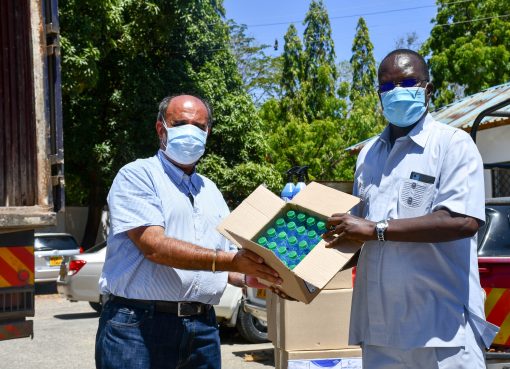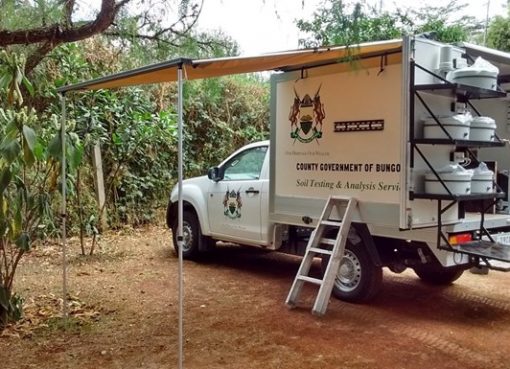The Kenya Plant Health Inspectorate Service (KEPHIS) in collaboration with Egerton University have trained 35 students from the University on food safety and aflatoxin management in a move aimed at reducing the rising burden of food-borne diseases and help in promoting public health.
The training which was conducted through the ‘Food Safety 4 Africa initiative’, also focused on fair trade practices towards ensuring preservation of food quality from production, handling, processing, preparation, and marketing in order to prevent contamination.
Food Safety 4 Africa initiative Principal Investigator Prof George Owuor said unsafe food has had devastating effects on the economy and businesses and emphasised the need to invest in a system that could ensure safety of food from the farms to the table.
Prof Owuor expressed optimism that the trained students will help in boosting farmers’ and traders’ safety practices to the required standards and also ensuring the safety of consumers.
He explained that the two-day training was aimed at enhancing students’ knowledge of mycotoxin detection, mycotoxins, harmful compounds produced by certain types of fungi that contaminate food products, laboratory safety, and innovative solutions to food contamination.
The principal investigator noted that simple food safety training for informal vendors could limit the spread of SARS, avian influenza, tuberculosis, and pathogens such as salmonella, adding that they have been empowering and encouraging farmers to apply Good Agricultural Practices (GAP) including food safety practices as it would enable them tap into more lucrative markets.
While emphasising the need for producing safe foods that benefit both local consumers and international markets, Prof Owuor underscored the project’s significance in combating aflatoxin contamination, which he termed as a persistent threat to food safety in Africa and argued that ensuring food safety was not only crucial for public health but also for enhancing Africa’s competitiveness in the global food trade.
Prof Owour indicated that the multifaceted challenges facing food safety and security in the country ranged from foodborne illnesses, potential risks associated with agricultural practices and poor food processing methods.
He emphasised on the need to implement rigorous inspection protocols at every stage of the food production and distribution process as one way of achieving food safety in the country.
“By conducting thorough inspections and audits, authorities can identify potential hazards and take immediate action to mitigate risks,” stated Prof Owuor.
He was happy that ‘Food Safety 4 Africa initiative’ places a strong emphasis on enhancing public awareness and education regarding food safety practices and regulations.
Through targeted campaigns and outreach efforts, Prof Owour said citizens could be empowered to make informed choices about the foods they consume and take proactive measures to protect themselves and their families from foodborne illnesses.
On technology, the Principal Investigator observed that by harnessing the power of technology, authorities could identify emerging trends, track foodborne outbreaks, and implement targeted interventions to safeguard public health.
The ‘Food Safety 4 Africa initiative’ is funded by the European Union (EU) and implemented in collaboration with partner countries, including Kenya, Ghana, Nigeria, and South Africa
Food Safety 4 Africa initiative Project Coordinator, Prof Paul Kimurto noted that while food safety was inherently a public good, the State agencies alone will not address the issue and said safety was a shared responsibility of all stakeholders including farmers, food handlers and distributors, food manufacturers, food service operators, consumers, regulators, scientists, educators, and the media.
“The safety of food is the result of the actions or inactions of many stakeholders operating under diverse conditions and circumstances,” he added.
Prof Kimurto said that courtesy of Food Safety 4 Africa initiative scientists at Egerton University in collaboration with various research agencies had developed groundnut varieties resistant to aflatoxin, formulated biocontrol agents to control aflatoxin contamination, and the encouraged innovative student-led solutions to food safety challenges.
The coordinator indicated that The Food Safety 4 Africa training provided Egerton University students with practical skills essential for careers in agriculture, food science, and crop protection. By interacting with KEPHIS experts, he added, students gained industry insights into food safety regulations and best practices in sample handling, extraction methods, and laboratory safety.
While indicating that the level of food safety had direct and indirect effects on national security, the economy and social development and must be maintained through strict adherence to food standards, Professor Kimurto noted that the food the public or animals consume should inspire confidence that they are not in danger of contamination.
He indicated that the prevalence of unsafe foods that aid in spreading foodborne illnesses continues to negatively impact economic development by eroding human health standards.
The World Health Organisation (WHO) notes that foodborne diseases are responsible for a comparable burden of illness such as cancer and tuberculosis in Africa, with young children bearing the brunt of it. WHO further indicates that the resulting health cost implications and threat to productivity is incapacitating.
It is estimated by the World Health Organisation (WHO) that 1 in 10 people in the world fall ill after eating contaminated food and around 420,000 die each year.
According to a study by WHO, roughly 1,140 lives per 100,000 lives are lost due to food borne diseases in Kenya. Apart from personal suffering for affected consumers, consumption of unsafe food increases public health costs for governments, reduces productivity of workers, and causes disruptions of food markets for business operators.
According to the Food and Agriculture Organisation of the United Nation (FAO), food security is only achieved when people have access to, among others, safe and nutritious food that is necessary for a healthy life.
By Esther Mwangi





